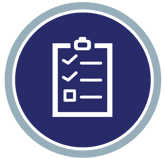The talent landscape continues to shift and present new challenges for insurance leaders. From the abrupt adoption of remote work and a focus on contingency planning at the start of the pandemic to the current “Great Reshuffle” (and potentially “the Great Regret”), ongoing evolution and real-time learning have been key themes throughout the past two-plus years.
 Currently, the industry is in one of the most challenging recruiting climates we’ve ever experienced. As a result, our team has been frequently sharing our unique perspective on a variety of topics with clients and other insurance leaders, industry publications and association partners. We’ve compiled a few of the most common questions our thought leaders are answering in the below Q&A. We hope you find their insight valuable as you move forward with your talent plans and an evolving state of “normal.”
Currently, the industry is in one of the most challenging recruiting climates we’ve ever experienced. As a result, our team has been frequently sharing our unique perspective on a variety of topics with clients and other insurance leaders, industry publications and association partners. We’ve compiled a few of the most common questions our thought leaders are answering in the below Q&A. We hope you find their insight valuable as you move forward with your talent plans and an evolving state of “normal.”  Q: In what ways has the pandemic changed how insurance leaders approach succession planning?
Q: In what ways has the pandemic changed how insurance leaders approach succession planning? A: The need for comprehensive succession plans that encompass a breadth and depth of positions has come to the forefront. Prior to the pandemic, many organizations had set succession and contingency plans for their c-suites, but didn’t necessarily consider their second and third layers of leadership or individual contributors with specific and rare skillsets.
A: The need for comprehensive succession plans that encompass a breadth and depth of positions has come to the forefront. Prior to the pandemic, many organizations had set succession and contingency plans for their c-suites, but didn’t necessarily consider their second and third layers of leadership or individual contributors with specific and rare skillsets.
Now, with accelerating retirements and an increased movement of talent, savvy insurers are focusing on more strategic and thorough succession planning. Internal leadership development and long-term career pathing are being prioritized to prepare companies for a variety of future scenarios.
We’re also seeing an increased commitment to DEI regarding access to executive opportunities. More diverse perspectives within the executive team and the boardroom lead to improved innovation and market share, among other positive business outcomes.
– Brett Carter, Managing Director

 Q: What are some of the main challenges of remote leadership and how can managers be most effective?
Q: What are some of the main challenges of remote leadership and how can managers be most effective? A: The role of a leader is continuing to evolve to best accommodate changing employee needs in virtual and hybrid environments. As organizational culture and work environments are redefined, managers must be committed to connecting their team members with each other, as well as the larger organization. Creating a sense of connection and shared culture that transcends locations is vital and must be approached intentionally and proactively.
A: The role of a leader is continuing to evolve to best accommodate changing employee needs in virtual and hybrid environments. As organizational culture and work environments are redefined, managers must be committed to connecting their team members with each other, as well as the larger organization. Creating a sense of connection and shared culture that transcends locations is vital and must be approached intentionally and proactively.
At the same time, management teams are having more frequent conversations around behavioral health. Insurers are reevaluating the need for EAPs while equipping their leaders with the tools and training to best respond to employee concerns and challenges. Individuals adopted several new normals – both personally and professionally – during the pandemic and leaders are working to identify ways their teams can move forward most effectively while providing ongoing support.
- Judy Busby, Senior Vice President of Executive Search and Corporate Strategy

 Q: Are insurers feeling the impacts of “the Great Reshuffle”? How can they come out ahead?
Q: Are insurers feeling the impacts of “the Great Reshuffle”? How can they come out ahead? A: Most insurers are experiencing recruiting difficulty and increased movement among their teams. In response to this “Great Reshuffle” of talent, it’s important to rethink employee retention and professional development strategies. “Stay interviews” can help managers better gauge their employees’ current job satisfaction and gain alignment on what it will take to keep those individuals with the company. Encourage candid and transparent conversations around whether your employees’ needs are being met and what they desire in a long-term role.
A: Most insurers are experiencing recruiting difficulty and increased movement among their teams. In response to this “Great Reshuffle” of talent, it’s important to rethink employee retention and professional development strategies. “Stay interviews” can help managers better gauge their employees’ current job satisfaction and gain alignment on what it will take to keep those individuals with the company. Encourage candid and transparent conversations around whether your employees’ needs are being met and what they desire in a long-term role.
Ensuring individuals are being compensated fairly is also crucial to retention. What would they receive if they interviewed for a similar role at another company? What else can you offer that may encourage them to stay? Proactively evaluate how you can gain employees’ loyalty, rather than wait to make a counteroffer when it is already too late.
- David E. Coons, Senior Vice President

 Q: Given recent retirements and the ongoing movement of talent, how can insurers grow and develop individuals to move the company forward?
Q: Given recent retirements and the ongoing movement of talent, how can insurers grow and develop individuals to move the company forward? A: While most managers recognize the importance of technical skills, one of the areas often overlooked in career development plans is leadership and interpersonal skills. Given today’s accelerating retirements and increase in voluntary turnover, it’s important to identify your high potential employees, pinpoint their strengths and areas for growth, and create customized plans to set both them and your organization up for success.
A: While most managers recognize the importance of technical skills, one of the areas often overlooked in career development plans is leadership and interpersonal skills. Given today’s accelerating retirements and increase in voluntary turnover, it’s important to identify your high potential employees, pinpoint their strengths and areas for growth, and create customized plans to set both them and your organization up for success.
This will look different depending on each organization. Even for companies that do not have formal HR-run leadership development programs, identifying the traits and interpersonal skills that are valued within your organization and providing training around them should be a priority. By integrating these skills into professional development plans – even at the more junior levels – insurance organizations will not only build future leaders, but also more effectively retain their high potential employees.
- Julie Dunn, Assistant Vice President and Engagement Director

 Q: What are you seeing in terms of salary expectations in the current market?
Q: What are you seeing in terms of salary expectations in the current market?
 A: To stay competitive, employers must review their compensation plans and ensure they’re at market value. As the demand for talent increases, so are candidates’ salary expectations; yet, many organizations are still calibrating to the current market. According to the BLS, insurance industry salaries have risen by nearly 8% since the start of the pandemic. Most active candidates are receiving two or three offers in today’s market, making it vital to present your best and highest offer to avoid missing out on top talent.
A: To stay competitive, employers must review their compensation plans and ensure they’re at market value. As the demand for talent increases, so are candidates’ salary expectations; yet, many organizations are still calibrating to the current market. According to the BLS, insurance industry salaries have risen by nearly 8% since the start of the pandemic. Most active candidates are receiving two or three offers in today’s market, making it vital to present your best and highest offer to avoid missing out on top talent.
While salary will always be important, other forms of compensation such as paid time off and performance bonuses can carry substantial weight in a comprehensive plan. Money alone will not ensure long-term job satisfaction, as evidenced by the emergence of “the Great Regret.” Continually seek feedback from employees about their current compensation and focus on how you can best meet their needs.
- Diana Shay, Assistant Vice President
For more on the current state of insurance talent, view our recent thought leadership.






